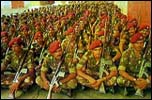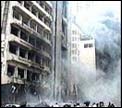The Rediff Special/J N Dixit
'India had no intention of signing an agreement that
did not have the endorsement of Tamil groups'
 In the meantime, Rajiv Gandhi met MGR and representatives of all the Opposition parties in Parliament in Delhi. The proposed Agreement
was explained in full and the endorsement of the Tamil Nadu government,
the Congress party in Parliament and all the Opposition parties
was obtained personally by the prime minister. He held further
discussions with senior members of his Cabinet and MGR on how
to tackle Prabhakaran and the LTTE.
In the meantime, Rajiv Gandhi met MGR and representatives of all the Opposition parties in Parliament in Delhi. The proposed Agreement
was explained in full and the endorsement of the Tamil Nadu government,
the Congress party in Parliament and all the Opposition parties
was obtained personally by the prime minister. He held further
discussions with senior members of his Cabinet and MGR on how
to tackle Prabhakaran and the LTTE.
At his meeting with Prabhakaran on July 28, Rajiv Gandhi persuaded
him to go along with the Agreement even if he did not formally
endorse it. The prime minister agreed to Prabhakaran's return
to Jaffna after the Agreement had been signed so that Prabhakaran
ensured the implementation of the cease-fire and surrender of
arms. India also gave the necessary assurances of the LTTE's future
security, participation in Sri Lankan politics and its major role
in the proposed government of the north-eastern provinces.
As far as the LTTE and Prabhakaran were concerned, Hardeep Puri
had conveyed categorical assurances from India that Prabhakaran
would have safe conduct, that he would be airlifted from Jaffna
by an Indian Air Force helicopter and that he would be dropped
back in Jaffna regardless of whether or not he agreed with the
proposals mooted for finding a compromise on the ethnic problem.
India acceded to every request of his concerning his visit to
Delhi between July 23 and August 21. He was allowed to bring along
his senior advisers, his bodyguards and members of his family.
We arranged for his discussions with the chief minister of Tamil
Nadu before he reached Delhi.
Two other points of criticisms voiced by Prabhakaran in later
years -- that he was kept under coercive custody, denied permission
to communicate with anybody during his stay in Delhi, and that
he was afraid of his life itself -- had no basis in fact. The original
plan was to put him up in one of the government bungalows in the
centre of New Delhi with appropriate security. He was not satisfied
with this arrangement. He said he would like to stay in a sufficiently
public place than in an isolated bungalow. He was, therefore,
put up in one of the VIP suites of the Ashoka Hotel. His advisers
were lodged in the same hotel.
 Expressing lack of confidence in
the Delhi police, he wanted more specialised personnel to provide
him security. This was provided at his specific request. His advisers
were present when the Tamil Nadu chief minister and Indian officials
met him in Delhi, during each of the meetings. He was provided
with telephone facilities to talk to his friends and associates
in Tamil Nadu. He was also provided with STD and IDD facilities
and he ran up a bill running into thousands of rupees on telephone
calls during his nine-day stay in Delhi in July/August 1987.
Expressing lack of confidence in
the Delhi police, he wanted more specialised personnel to provide
him security. This was provided at his specific request. His advisers
were present when the Tamil Nadu chief minister and Indian officials
met him in Delhi, during each of the meetings. He was provided
with telephone facilities to talk to his friends and associates
in Tamil Nadu. He was also provided with STD and IDD facilities
and he ran up a bill running into thousands of rupees on telephone
calls during his nine-day stay in Delhi in July/August 1987.
The only restriction placed on him was one which the Governments of
India and Sri Lanka placed on themselves too. The media was not
allowed to be in touch with any party negotiating the agreement
for legitimate and obvious reasons. Such a sensitive agreement
could not be negotiated with the dubious wisdom and commentary
of the media affecting its progress.
It must also be mentioned that the details of the agreement had
been discussed by Hardeep Puri with Prabhakaran and his colleagues
and some very senior LTTE sympathisers before Prabhakaran was
brought to Delhi for discussions with Rajiv Gandhi. Apart from
Prabhakaran, Hardeep Puri had discussed the outline of the Agreement
with LTTE leaders Yogi, Thileepan, Constantine, Santhosan, and
Rahim. In the meetings Hardeep Puri held with Prabhakaran on July
19 and 23, 1987, Prabhakaran's colleagues -- Mahatya, Kumarappan,
Johnnie, Thileepan, Yogi and Shankar -- were present.
 The point in recalling all these details is to establish that
the LTTE complaint that Tamil groups were not fully informed about
the Agreement and that they were duped into it is totally at variance
with facts. India had no intention of signing an agreement that
did not have the endorsement of Tamil groups. This approval was
very much there, from the TULF at the one end of the spectrum
to the LTTE at the other end.
The point in recalling all these details is to establish that
the LTTE complaint that Tamil groups were not fully informed about
the Agreement and that they were duped into it is totally at variance
with facts. India had no intention of signing an agreement that
did not have the endorsement of Tamil groups. This approval was
very much there, from the TULF at the one end of the spectrum
to the LTTE at the other end.
Excerpted from Assignment Colombo, by J N Dixit, Konarak Publishers, 1998, Rs 400, with the publisher's permission.
Readers interested in obtaining a copy of the book may direct their enquiries to Mr K P R Nair, Konarak Publishers, A-149, Main Vikas Marg, New Delhi 110 001.
Tell us what you think of this feature
|



